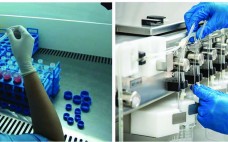Viral safety is required for biologics manufactured to treat human diseases. Although significant improvements in ensuring viral safety have been made over the past few decades, “zero risk” of viral contamination is a myth. Viral contamination risk can be carefully managed by screening raw materials, testing process intermediates, and evaluating how effectively manufacturing processes remove and inactivate viruses. Viral clearance studies verify virus removal or inactivation by a manufacturing process. Although regulatory agencies have expectations for the designs of those…
Business
Information Instead of Data: User-Friendly HMI Concept Increases Process Control Efficiency
Today, most plant operators are much more than classic process operators. In addition to operational process control, their range of tasks includes product quality assurance, optimization of resources, and maintenance of high‑throughput rates. Qualified information is necessary to reliably perform those tasks. The human–machine interface (HMI) of a process control system provides visualization. Siemens regards new HMI concepts such as advanced process graphics (APG) as the key to task‑specific or situation‑specific decision‑making (Photo 1). Graphics Monitor: the Process Window Before…
Can English Unite SE Asian Markets?
By 2016, the global pharmaceutical industry is expected to generate an estimated 30% of its total sales in emerging markets (1). After India and China, southeast countries such as Indonesia, Singapore, Malaysia, Vietnam, and Thailand are especially attractive markets. The Association of Southeast Asian Nations (ASEAN) Economic Community (AEC) consists of 10 countries united through regional economic cooperation: Thailand, Myanmar, Laos, Vietnam, Malaysia, Singapore, Indonesia, Philippines, Cambodia, and Brunei. The ASEAN Community 2015 (AEC 2015) initiative aims to form a…
To Serve and Promote: A Conversation with BIO’s President and CEO
BIO is the world’s largest trade association representing biotechnology companies, academic institutions, state biotechnology centers and related organizations across the United States and in more than 30 other nations. BIO members are involved in the research and development of innovative healthcare, agricultural, industrial, and environmental biotechnology products. BIO plays a leading role in shaping public policy related to the biotechnology industry — at the state, national, and international levels. Jim Greenwood has been BIO’s president and CEO for 10 years,…
Planning for Commercial Scale of Cell Therapy and Regenerative Medicine Products, Part 1: Achieving Manufacturability and Managing Cost of Goods
Much mystique and mystery surround the emerging industries of cell therapy and regenerative medicine. As companies progress toward commercial manufacture with potential game changers (e.g., cures for cancer and diabetes) the industry could be on the verge of significant breakthroughs. However, with no real successes to date, the question is raised: What core attributes are required to achieve commercial success? The tale of Dendreon’s struggles highlights how difficult it can be to commercialize even an approved cell therapy product. Since…
When Is a Virtual Business Model Suitable for Biopharmaceutical Companies?
Virtual companies are based on the model that all activities are outsourced. Such companies have no (or few) employees, occupy no laboratory space, and use contract service organizations for all activities. Over the past decade, several virtual biopharmaceutical companies have formed (1–4). They are primarily start-up ventures that use contract research organizations (CROs) for R&D and contract manufacturing organizations (CMOs) for product manufacturing. By contrast, a fully integrated biopharmaceutical company is based on the model that all activities are internal to…
QBD Manufacturing Strategies: The CMC Strategy Forum Series, Part 2
The CMC Strategy Forums provide a venue for biopharmaceutical product discussion. They focus on relevant chemistry, manufacturing, and controls (CMC) issues throughout the life cycle of a therapeutic and thereby foster collaborative technical and regulatory interaction. Forum chairs share information with regulatory agencies to help them merge good scientific and regulatory practices. Outcomes of the forum meetings are published in BioProcess International and on the CASSS website. This process is meant to help ensure that biopharmaceutical products manufactured with advancing…
New Paradigms for Process Validation: A Practical Approach
Both the United States and the European Union offer guidance on a life-cycle approach to process validation. This goes beyond the traditional three to five lots run at the center point of proposed ranges for operating parameters. New approaches leverage product design and process development information. They facilitate adapting the QbD paradigm to allow for a science- and risk-based selection of critical process parameters, key process indicators, and appropriate specification criteria. The number of runs for process performance qualification (PPQ)…
Raw Material Control Strategies for Bioprocesses
The 15th WCBP CMC Strategy Forum, “Raw Material Control Strategies for Bioprocesses,” met on Sunday, 11 January 2009 in San Francisco, CA. This forum considered the design and implementation of control strategies for complex raw materials used in bioprocessing. Discussion focused on key approaches and application of risk assessment tools that can be used to identify and assist in mitigating potential safety and efficacy concerns that can affect the quality of biological products. Two Sessions To fully explore the topic,…
Multiproduct Facility Design and Control for Biologics: Challenges and Considerations
Multiproduct facilities are increasingly integral to corporate biologics network and supply chain strategies. Manufacturing capacity strategies ensuring appropriate facility design and procedural controls to manage the risks of producing multiple products are critical to the successful deployment of commercial and clinical supply plans. A Chemistry, Manufacturing, and Controls (CMC) Strategy forum was held in Bethesda, MD, in August 2011 to highlight various challenges, risks, and control strategies associated with multiproduct facilities. Multiproduct strategies for the manufacture of a variety of…






